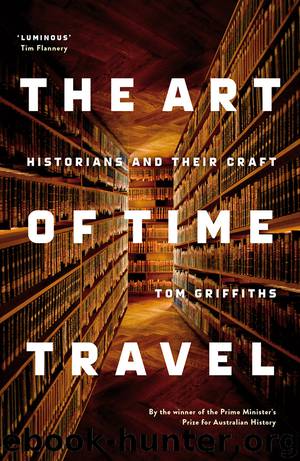The Art of Time Travel by Tom Griffiths

Author:Tom Griffiths
Language: eng
Format: epub
Publisher: Schwartz Publishing Pty. Ltd
As David Goodman, one of Donna’s students, put it, ‘Postmodernism is not some exotic importation, but a part of a set of debates in which we are all implicated.’ Goodman was arguing against the polarising effect of ‘theory’ on history in the 1990s: ‘There are still, unfortunately, two cultures in history today,’ he wrote. ‘The divide is theory.’ But ‘theory can be enlivening’, Goodman went on to suggest. ‘It can provoke insights and provide reasons for wanting to study the past in the first place. I for one stayed in history because I had teachers who convinced me that the big questions of social or political or literary theory were all the business of the historian – that historians had to be participants in the debates in the contemporary humanities, not simply breathless reporters of what actually happened back then.’19
I stayed in history for the same reason as Goodman, who was a contemporary of mine. A world of exciting ideas was opened up to us by history and we were expected to forge an informed relationship with it. The past was a testing ground for thought. Studying English Literature at the same time, I had felt that I was trying to second-guess some undeclared orthodoxy that defined right and wrong answers and good and bad texts. Consequently, there was an exodus of literary-minded students from English to History at Melbourne University in the mid-1970s. The contextual relativism of history – the belief that the meaning of a text was not pre-ordained but awaited discovery – was exhilarating.
For Donna, the 1970s and ’80s were ‘decades filled with new ways of thinking about and writing history … historians, yes, but also anthropologists, literary critics, essayists, philosophers, art historians and those doing cultural studies. There were new ways to think about recovering the past (Michel Foucault, Hayden White), many modes of writing to explore (Geertz, Dening, Greenblatt, Barthes), new understandings of ourselves as gendered human beings (Joan Scott), and new methodologies for grasping colonialism and post-colonialism (Chakrabarty, Said, Peter Hulme).’ ‘Many historians’, she reflected, ‘found themselves unsettled by the options these discourses offered. I believed they should be put before the eyes of students.’ This was where Donna’s philosophy of history course was already heading – from history as science to history as art, from the strictures of logic and proof to the liberation of narrative and experiment. Donna was not defensive or fearful about postmodernism and ‘the linguistic turn’. Rather, she argued that ‘its strategies are the business of anyone using language. And their implications should be among our bread-and-butter concerns.’20
Donna Merwick’s teaching of the philosophy of history, although radical, built on the traditions of the Crawford School. Her American PhD supervisor, Merle Curti, was a dear friend and correspondent of Crawford’s, who spent a sabbatical at Wisconsin in 1959.21 Curti and Crawford had both moved from literary to historical studies and both were devoted to the history of ideas. Donna’s two key words in her teaching – ‘precision’ and ‘imagination’ – happened to echo Crawford’s vision of the tightrope of historical analysis.
Download
This site does not store any files on its server. We only index and link to content provided by other sites. Please contact the content providers to delete copyright contents if any and email us, we'll remove relevant links or contents immediately.
The Memory Code by Lynne Kelly(2401)
Schindler's Ark by Thomas Keneally(1884)
Kings Cross by Louis Nowra(1796)
Burke and Wills: The triumph and tragedy of Australia's most famous explorers by Peter Fitzsimons(1426)
The Falklands War by Martin Middlebrook(1383)
1914 by Paul Ham(1345)
Code Breakers by Craig Collie(1252)
A Farewell to Ice: A Report from the Arctic by Peter Wadhams(1248)
Paradise in Chains by Diana Preston(1247)
Burke and Wills by Peter FitzSimons(1237)
Watkin Tench's 1788 by Flannery Tim; Tench Watkin;(1232)
The Secret Cold War by John Blaxland(1213)
The Protest Years by John Blaxland(1205)
THE LUMINARIES by Eleanor Catton(1194)
30 Days in Sydney by Peter Carey(1160)
Lucky 666 by Bob Drury & Tom Clavin(1155)
The Lucky Country by Donald Horne(1140)
The Land Before Avocado by Richard Glover(1119)
Not Just Black and White by Lesley Williams(1085)
